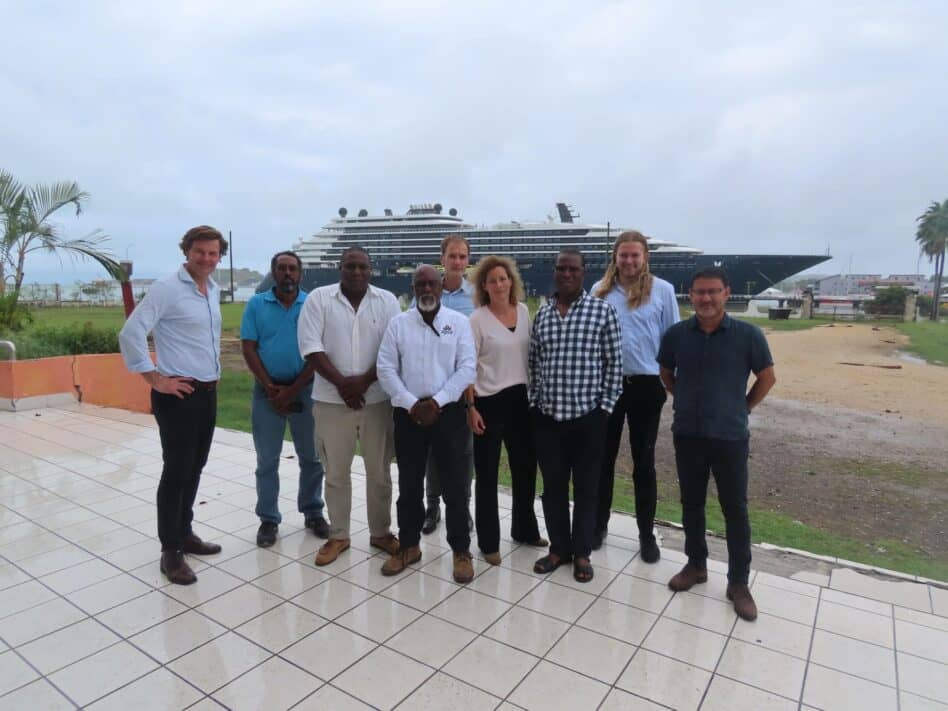
Innovative Water Solutions for Resilience: Xploration Coastline Initiative in the Caribbean by Brent Simon
The Caribbean islands face critical challenges in water resource availability due to Climate Change, economic dependencies and limited infrastructure. OceansX’s Xploration Coastline Initiative, spearheaded by founder Berend van de Kraats and his associates Hans Bouchier, Meike Bartels and Karelius Walna offers a groundbreaking solution to these issues.
This mobile, modular and autonomous water production network will be tailored to the unique needs of Small Island Developing States (SIDS). In the first phase it is hoped that the beneficiaries would be St. Kitts, Saba, Saint Eustatius along with Antigua and Barbuda.
The concept which integrates sustainable innovation with adaptive maritime technologies, aims to produce 250,000 gallons of water per day using reverse osmosis technology powered by green energy, was introduced to potential stakeholders in Antigua and Barbuda on 18 -19 November 2024, at the Multipurpose Centre at Perry Bay.
This approach aligns with the UN Water Action Agenda (item #49239), which emphasizes equitable water distribution and governance.
The attendees at the meeting included Mr. Walter Christopher/ Permanent Secretary (PS) Ministry of Agriculture, Ms. Sandra Joseph/ Permanent Secretary (PS) Ministry of Tourism, Mr. Gregory Bailey/Director of Agriculture, Mr. Owolabi Elabanjo/Chief Extension Officer, Mr. Ika Fergus/Extension Officer, Mr. Brian Nicholas/Water Engineer-APUA, Dr. Tricia Lovell/Deputy Chief Fisheries Officer, Mrs. Angela Ephraim/GARDC representative, Mrs. Nicolette Francis/Agricultural Science Education Officer- Ministry of Education and Mr. Melvin Medina/FAO Plant Production and Protection Officer. Their participation underscores local commitment to this ambitious project, which envisions a regional, floating water network connecting the islands to each other.
Mr. Bailey stated that the genesis of this consultation occurred at the Caribbean Week of Agriculture 2023. His interest in the project is directly related to the fact that access to water is the backbone of agriculture. With better access to water he says, the potential to increase crop yields is viable.
Mr. Bailey was also enthusiastic about the cost factor of the initiative as the majority of investment would be deferred with the local government responsible only for the last mile of infrastructure to support the transfer of the water from the vessels which produce it the land.
The initiatives milestones emphasize actionable roadmaps and long-term collaboration. In 2024, initial scoping assessments are underway to evaluate the feasibility and community engagement strategies needed for successful implementation.
Future plans include legal frameworks, financing models, and proof-of-concept operations by 2026. The adaptive infrastructure also provides a blueprint for global resilience, particularly for crisis relief and sustainable development.
Xploration Coastline’s benefits extend beyond water production. It addresses redundancy in infrastructure, catalyzes agricultural activities, and enhances public health/wellness and disaster preparedness.
Moreover, the project’s emphasis on continuous optimization, innovative funding, and social governance highlights its potential as a model for other regions.
Collaboration with key stakeholders, such as UNICEF, FAO, and regional governments is vital for sustaining this initiative. By fostering public and private sector partnerships and leveraging catalytic funding mechanisms, OceansX envisions a resilient, inclusive water network that prioritizes local governance and shared responsibility.
As the Xploration Coastline program unfolds, it holds promise as a transformative solution for SIDS, addressing urgent water challenges while fostering regional solidarity and resilience. This innovative maritime concept highlights the importance of adaptive, sustainable infrastructure in a rapidly changing world.
Advertise with the mоѕt vіѕіtеd nеwѕ ѕіtе іn Antigua!
We offer fully customizable and flexible digital marketing packages.
Contact us at [email protected]

















If you’re going to do solar why not consider desalination? The problem with these reverse osmosis plants is the govt is too cheap to change the membranes on time then we’re back in the same situation in a few years.
Comments are closed.